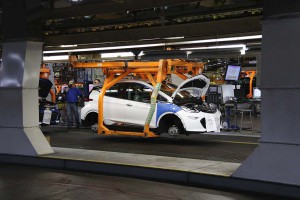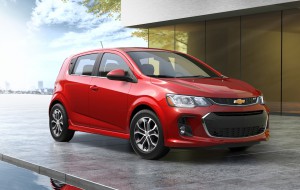
GM extended the shutdown period for the Orion, Michigan, plant that produces the Chevy Bolt and Sonic due to slow sales for both.
With sales lagging and inventories bulging, General Motors is extending the shutdown of a plant in the Detroit suburbs that produces its Chevrolet Bolt EV, along with the conventionally powered Chevy Sonic subcompact.
The decision to extend a prior production cutback comes as a disappointment for GM, which had hoped to break into the mass market with the Bolt, the world’s first long-range battery-car to be sold at a mainstream price – just over $35,000 before applying a federal tax credit.
The automaker says the shutdown at the Orion Township, Michigan, plant is “due solely” to weak demand for the Sonic. But there are nonetheless bulging inventories of the Bolt on U.S. dealer lots. By contrast, Tesla Motors is claiming it intends to rapidly ramp up production in order to meet what is believed to be an 18-month backlog of initial reservations for its similarly priced Model 3 battery-car.
Chevy launched the Bolt in December 2016, quickly winning kudos for the EV. It was, among other things, named both North American Car of the Year and Motor Trend Car of the Year.
(GM hits road with new fleet of 130 fully autonomous Bolt EVs. For the story, Click Here.)
GM’s largest brand had hoped to build demand by offering the vehicle at less than $30,000 after factoring in the $7,500 federal tax credit. Bolt also could, with an EPA-estimated 235 miles range, travel more than twice as far per charge as other lower-priced electric vehicles now on the market. Most, such as the Ford Focus EV, could barely nudge the 100-mile range mark.

Small car sales continue to struggle as gas prices remain low, forcing GM to extend the shutdown of its Orion plant.
But demand has been soft, Chevy selling just 7,592 Bolts during the first half of 2017. Meanwhile, inventories jumped from a 104-days supply at the end of June to 111 a month later, even as the automaker began rolling Bolt out to dealers across the U.S. It was initially launched in California, the largest market for EVs in the U.S.
The Reuters news service noted that one Rhode Island dealer, Paul Masse Chevrolet, claimed to have 200 of the battery-cars in inventory, an unusually large number.
(Click Here to see more about GM hustling to get its first EV on the road in China.)
Chevy had hoped to gain a first-mover advantage over competitors – including Tesla, which only began producing the new Model 3 this month. But Tesla has built up a cult-like following and a massive order bank, the company believed to now have as many as 500,000 initial reservations for the new sedan, each with a $1,000 deposit.
The question is how many of those will actually translate into firm orders. Tesla CEO Elon Musk has suggested it will take about 18 months to meet initial demand as the company ramps up production at its Fremont, California, assembly plant to a pace of about 500,000 vehicles annually. At that point, the new Model 3 would account for about 80% of the plant’s capacity.
Tesla has also been suggesting it will add a number of new assembly plants – it is now negotiating to open one in China – while also adding as many as 20 more Gigafactory battery plants around the world, according to Musk.
(To see more about GM’s Reuss prediction the company will be first with a profitable EV, Click Here.)
The extended summer closure of the GM plant near Detroit comes as the maker has had to idle a number of other factories, most producing slow-selling sedans and other passenger car models. That includes plants in Kansas City, Kansas; Lordstown, Ohio; and Oshawa, Ontario.

Tesla buyers don’t buy Chevys.